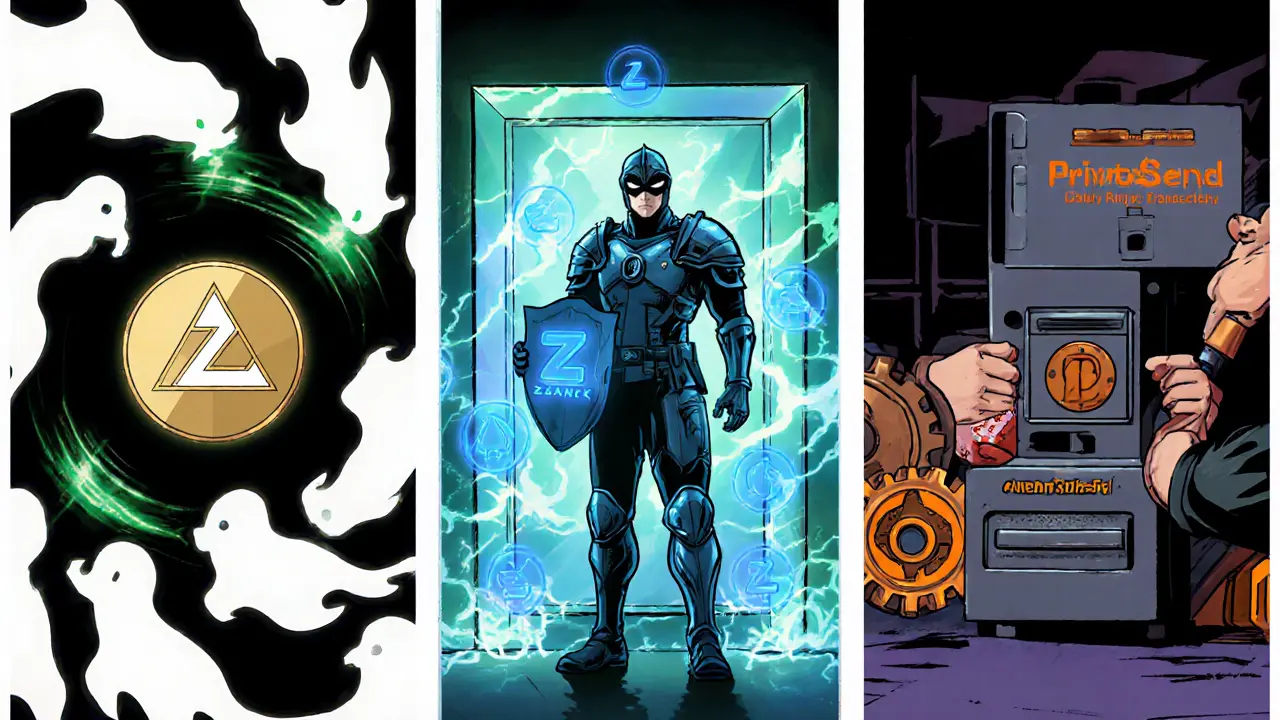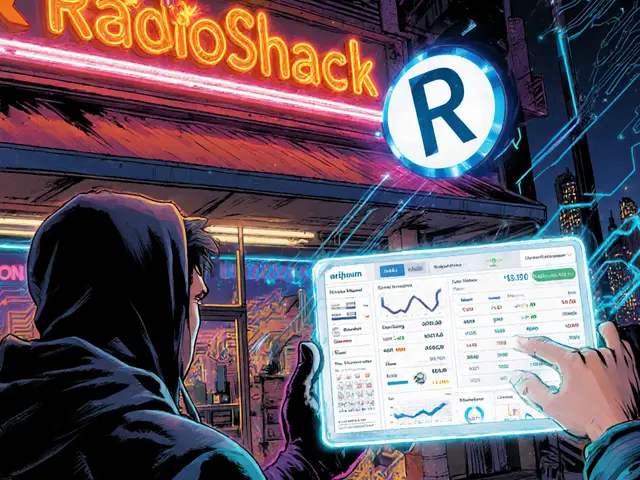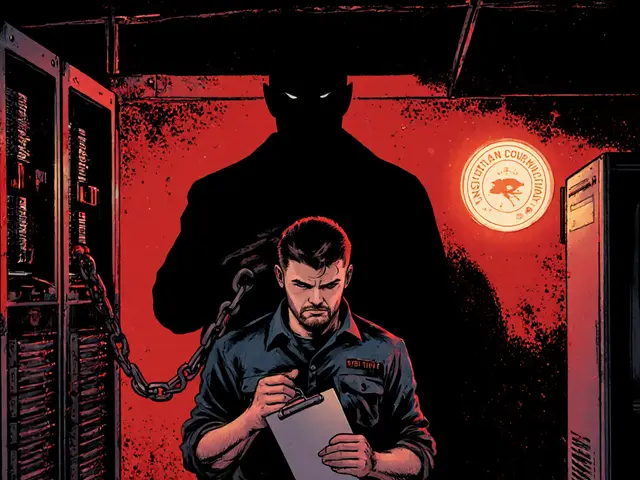Privacy Cryptocurrencies: How Their Payment Features Keep Transactions Hidden
Privacy Coin Comparison Tool
Use this tool to compare the key features of popular privacy cryptocurrencies. Select a coin to see detailed information about its privacy model, transaction characteristics, and regulatory status.
Monero
Mandatory PrivacyUses ring signatures, stealth addresses, and RingCT in every transaction
Zcash
Optional PrivacyUses zk-SNARKs for shielded transactions
Dash
Optional PrivacyUses CoinJoin PrivateSend for anonymity
Privacy Model
Transaction Characteristics
- Average Transaction Speed:
- Typical Fee:
- Mandatory Privacy:
Regulatory Status
User Experience
Key Privacy Features Explained
Ring Signatures
Mixes a real transaction with decoy transactions, making it impossible to identify the true spender.
Stealth Addresses
Generates a unique destination address for each payment, so only the recipient can recognize and spend the funds.
RingCT
Obscures transaction amounts by encrypting them within a ring signature.
zk-SNARKs
Allows demonstrating a transaction is valid without revealing any underlying data.
When you hear the term privacy cryptocurrencies is a class of digital currencies built to conceal who sent money, who received it, and how much was transferred, the first question is usually *why* anyone would need that level of secrecy. The answer lies in the same reasons cash works: you want to pay without leaving a paper trail that governments, corporations, or criminals can follow. Unlike Bitcoin, where every transaction is an open ledger, privacy‑focused coins scramble the data so that tracing becomes practically impossible.
Key Takeaways
- Monero, Zcash, and Dash dominate the privacy‑coin market, each using a distinct cryptographic approach.
- Mandatory privacy (Monero) offers stronger anonymity but faces heavier regulatory pressure.
- Optional privacy (Zcash) balances compliance and secrecy, yet only a fraction of users exploit the shielded mode.
- Regulators are tightening the Travel Rule, pushing many exchanges to delist privacy coins.
- Future tech like zk‑STARKs and MimbleWimble may bring privacy to mainstream blockchains.
Why Payment Privacy Matters
Financial privacy protects individuals from unwanted surveillance, preserves the fungibility of a currency (every unit should be interchangeable), and shields users from targeting by hostile regimes or criminal groups. In practice, a truly private coin behaves like cash: you can hand it over without anyone being able to link the transaction to you later.
Core Cryptographic Tools
Different coins rely on different math, but the goal is the same - hide the three pillars of a transaction: sender, receiver, amount.
- Ring signatures mix a real transaction with several decoys, making it impossible to pinpoint the true spender.
- Stealth addresses generate a one‑time destination for each payment, so only the recipient can recognize and spend the funds.
- RingCT obscures transaction amounts by encrypting them within a ring signature.
- zk‑SNARKs allow a prover to demonstrate a transaction is valid without revealing any underlying data.
- Lelantus Spark lets users “burn” old coins and mint new ones with no transaction history attached.
- Dandelion++ hides the origin IP address when a transaction is first broadcast to the network.
Leading Privacy Coins and Their Features
Monero uses ring signatures, stealth addresses, and RingCT in every transaction, making privacy mandatory. Launched in 2014, it now holds over $4billion market cap and is praised for “untraceable” status by analysts at Chainalysis and Elliptic.
Zcash offers optional shielded transactions based on zk‑SNARKs, letting users choose between full privacy or full transparency. As of 2025, only about 15% of ZEC transfers are shielded.
Dash provides PrivateSend, a CoinJoin‑style mixer that users can enable for optional anonymity. Its InstantSend feature makes payments settle in seconds, appealing to merchants.
Firo relies on Lelantus Spark and Dandelion++ to break transaction links and hide network‑level metadata. It’s a niche player but showcases an alternative to ring‑based designs.
Grin implements MimbleWimble, a protocol that aggregates transactions and discards spent outputs, resulting in a compact, private ledger. Beam follows the same model but adds optional confidential assets.

Feature Comparison
| Coin | Privacy Model | Mandatory? | Avg Tx Speed | Typical Fee (USD) | Regulatory Status |
|---|---|---|---|---|---|
| Monero | Ring signatures + RingCT + Stealth | Yes | 2‑3min | ~0.30 | Delisted on most CEXs (EU, US, KR) |
| Zcash | zk‑SNARKs (shielded) | No (optional) | 1‑2min (shielded) | ~0.20 | Listed but with compliance tags |
| Dash | CoinJoin PrivateSend | No (optional) | Instant (InstantSend) | ~0.10 | Generally accepted on CEXs |
Regulatory Landscape in 2025
The Financial Action Task Force’s Travel Rule demands that exchanges share sender and receiver info for transfers above a set threshold. Privacy coins that hide that data clash with the rule, prompting delistings across Europe, South Korea, and increasingly the United States. The FATF’s latest guidance labels “anonymous‑by‑default” protocols as high‑risk, nudging custodial platforms to avoid them. Meanwhile, the EU’s MiCA framework, still under debate, could impose stricter reporting requirements that many privacy‑coin projects can’t meet without sacrificing core anonymity.
Because of these pressures, users are shifting to non‑custodial swap services such as Flashift, SideShift, and ThorChain, which operate without KYC. This trend has driven a 200% jump in DEX volume for privacy coins in 2025 alone.
User Experience: What You’ll Face
Choosing a privacy coin isn’t just about cryptography; it’s about daily friction.
- Monero: Wallet sync can take 2‑3hours, transaction fees hover around $0.30, and learning curve includes ring‑signature concepts. However, the community provides extensive tutorials and a robust GUI wallet (e.g., Monero GUI).
- Zcash: Transparent transactions behave like Bitcoin - simple to send. Shielded sends require a “z‑address” and a viewing key, adding roughly 1‑2hours of setup. Fees are lower, about $0.20, but privacy pool size remains limited.
- Dash: PrivateSend is a one‑click option inside the official wallet; configuring a mix takes about 30minutes. Fees are the lowest among the three, but anonymity is weaker because mixing rounds are optional.
- Firo & MimbleWimble coins: Their wallets are still maturing; users often rely on command‑line tools, making them best suited for technically comfortable users.
Across all coins, operational security matters: using a VPN or Tor, never reusing addresses on public exchanges, and keeping backup seed phrases offline are non‑negotiable practices.
Future Trends: Privacy Beyond Stand‑Alone Coins
Developers aren’t idle. Monero’s 2025 update shaved 10% off transaction size by optimizing ring‑signature algorithms. Zcash moved from zk‑SNARKs to zk‑STARKs, eliminating the trusted‑setup ceremony and boosting security. Meanwhile, projects like Ethereum are experimenting with built‑in zero‑knowledge rollups, meaning future DeFi apps could inherit privacy without needing a separate coin.
Regulators are also prompting “selective disclosure” features-cryptographic proofs that reveal only what’s legally required while keeping everything else hidden. If such tools gain traction, privacy coins could survive mainstream compliance checks without abandoning anonymity.
Analysts at Gartner predict that by 2026, half of all blockchain transactions will embed some form of privacy tech, either through dedicated coins or layer‑2 solutions. The niche market may stay small in dollar terms, but its influence on the broader ecosystem could be huge.
Getting Started: A Quick Checklist
- Identify your privacy priority: mandatory (Monero) vs optional (Zcash/Dash).
- Choose a wallet that supports the needed features (e.g., Monero GUI, ZecWallet, Dash Core).
- Secure your connection with a VPN or Tor before any transaction.
- Back up seed phrases in multiple offline locations.
- If you need to move coins off‑exchange, use a non‑custodial swap service that respects privacy.

Frequently Asked Questions
Is Monero really untraceable?
Yes. Because every transaction bundles ring signatures, stealth addresses, and RingCT, analysts at major blockchain‑research firms have publicly stated they cannot link a Monero transaction to a specific wallet.
Why are shielded Zcash transactions so rare?
Shielded sends require extra computational work and the use of special z‑addresses. Many users stick with transparent transfers for speed and lower fees, which keeps the shielded pool small.
Can I use Dash PrivateSend for large purchases?
PrivateSend mixes a limited number of inputs per transaction, so the anonymity set shrinks as the amount grows. For very large amounts, users often chain multiple mixing rounds or switch to Monero.
What’s the biggest regulatory risk for privacy coins?
The Travel Rule enforcement means exchanges must collect identity data. Because privacy coins hide that data by design, many jurisdictions force delistings, leaving users to rely on decentralized swaps.
Will mainstream blockchains adopt privacy features?
Yes. Ethereum’s zk‑rollups, Bitcoin’s Taproot‑enabled Schnorr signatures, and upcoming Layer‑2 confidential transactions all point toward privacy becoming a standard layer rather than a niche add‑on.






14 Comments
celester Johnson
August 23 2025In the grand theater of crypto, privacy coins are the phantom actors that refuse to bow to the spotlight of surveillance. Their very existence asks us: what is freedom when every transaction is a whisper lost in a tempest? Yet, we must ask whether that whisper becomes a siren luring us into regulatory abyss. The paradox of invisibility is both a shield and a curse, tearing at the fabric of trust.
Sophie Sturdevant
August 23 2025Look, if you want real financial stealth you need to stack the deck with proper tooling – think multi‑hop VPNs, Tor routing, and a wallet that defaults to mandatory privacy. Zcash’s optional shielded mode is a half‑measure, whereas Monero’s ring signatures give you true deniability. Deploy the right protocol and you’ll cut through KYC ladders like a hot knife through butter.
Nathan Blades
August 24 2025Privacy isn’t a luxury; it’s the cornerstone of a truly decentralized financial ecosystem.
When you send a Monero transaction, you’re not just moving value – you’re sending a statement that your economic agency belongs to you alone.
The ring signatures blend your spend with a chorus of decoys, making it mathematically impossible to single you out.
Stealth addresses generate a one‑time destination, ensuring that even the recipient’s inbox can’t be linked back to a public ledger.
RingCT takes the final step, encrypting the amount so no outside observer can infer the scale of the trade.
Contrast that with Zcash’s shielded pool – a noble effort, but limited by a small user base that refuses to adopt the heavy‑weight zk‑SNARK computations.
Dash’s PrivateSend is convenient but suffers from optionality, shrinking its anonymity set as transaction sizes grow.
Regulators, blind to these nuances, slam privacy coins with travel‑rule mandates, hoping to force transparency.
Yet, the very act of delisting pushes users toward non‑custodial swaps, where privacy thrives in the shadows of decentralized exchanges.
Future advancements like zk‑STARKs promise to eliminate trusted‑setup ceremonies, unlocking higher security without sacrificing speed.
Layer‑2 solutions on Ethereum are already piloting zero‑knowledge rollups, foreshadowing a world where privacy is native, not an afterthought.
Selective disclosure protocols could satisfy compliance while preserving anonymity, a win‑win that regulators can’t ignore.
In practice, the user experience matters: a wallet sync that takes hours can deter newcomers, but community tutorials lower that barrier.
Bottom line: choose the coin that aligns with your privacy appetite – mandatory Monero for maximal secrecy, optional Zcash or Dash for a balance between usability and concealment.
Somesh Nikam
August 25 2025Great breakdown! If you’re just starting out, the Monero GUI makes the sync process less intimidating, and the community tutorials are a solid safety net. Remember to always pair your wallet with a VPN or Tor for that extra layer of network‑level privacy.
Jan B.
August 26 2025Monero’s mandatory privacy is a double‑edged sword – unbeatable anonymity but a headache for exchanges.
MARLIN RIVERA
August 26 2025Delistings are a symptom of regulatory panic, not a sign of technical failure. Users will always find workarounds.
Debby Haime
August 27 2025If you want speed and low fees, Dash’s InstantSend is unbeatable, but don’t expect the same level of anonymity you get with Monero. Mixing is optional, so the anonymity set can shrink quickly for large amounts.
emmanuel omari
August 28 2025While you chase convenience, remember that privacy isn’t a game you can win by picking the easiest coin. The sovereignty of your financial data demands the rigor of mandatory privacy protocols.
Andy Cox
August 29 2025Interesting points. I think it’s worth noting that cultural differences affect how people perceive privacy – some regions value anonymity more than others, which drives adoption patterns.
Courtney Winq-Microblading
August 29 2025Exactly, the perception of privacy is as much a social construct as it is a technical one. In many communities, using a privacy coin is seen as an act of digital self‑defense, a rebellion against pervasive surveillance.
katie littlewood
August 30 2025When you line up the features, the picture becomes clearer: Monero offers the most robust anonymity at the cost of a heavier wallet sync and higher fees; Zcash gives you a choice, but the shielded pool remains underutilized, limiting its protective benefits; Dash delivers lightning‑fast transactions with a modest privacy boost that’s best suited for everyday purchases where you don’t need rock‑solid secrecy. Users should weigh these trade‑offs against their own risk tolerance and the regulatory climate of their jurisdiction, especially as compliance frameworks continue to tighten around anonymous transactions.
Jenae Lawler
August 31 2025While the analysis is thorough, I contend that the emphasis on privacy wallets underestimates the inevitable march toward standardized KYC solutions, which will render many of these anonymity mechanisms moot in the regulated sphere.
Chad Fraser
September 1 2025Don’t let the regulatory chatter scare you off – there are still plenty of ways to stay private while enjoying fast payments. Keep your wallet updated, use a VPN, and consider mixing services when you need that extra layer of anonymity.
Jayne McCann
September 1 2025Privacy isn’t a fad, it’s a necessity.